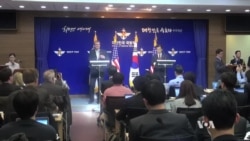U.S. Defense Secretary Ash Carter, on a visit to South Korea, said the U.S. military is preparing to deploy new weapons in the region, including stealth fighters and different classes of naval vessels, but is not yet prepared to discuss deployment of an advanced missile defense system.
"Our newest and best things are being deployed to this part of this part of the world," Carter told reporters Friday after talks with South Korean President Park Geun-hye and Defense Minister Han Min-koo.
THAAD system not ready yet
One topic not on the agenda was the Terminal High Altitude Area Defense missile system, or THAAD. Carter said Friday the systems aren't ready yet.
"We are not at the point yet of determining where it might be suitably deployed in the future,” he said.
Seoul itself is divided over the THAAD issue. Its largest trade partner, China, opposes having the missile defense system on the peninsula.
Also Friday, Carter visited the Cheonan memorial, a solemn reminder of how volatile and unpredictable the threat from North Korea can be. He is the first U.S. defense secretary to visit the memorial, which honors the 46 sailors who died when a North Korean sub fired a torpedo on the warship in 2010.
"Peace and stability isn't automatic. It has to be defended, and that's what peaceful and democratic alliances like ours stand for," he said while touring the memorial.
On Thursday, Carter visited with U.S. troops stationed on the peninsula, thanking them for contributing to the region's peace and prosperity. The troops here must be ready to quickly respond to potential North Korean attacks.
“Our wing commander is always touting our ability to fight tonight," said Captain Van Morrissey, an American fighter pilot, told VOA. "We are always on the hook within zero hours notice to take the fight to the North if we need to.”
Carter leaves Seoul early Saturday to visit troops at Pacific Command headquarters in Hawaii.
Concern about N. Korea missile testing
Earlier, during a visit to Japan, Carter told reporters that Pyongyang's recent testing of missiles is a reminder of how dangerous the situation is on the Korean peninsula.
The short-range missiles were launched this week into the sea off North Korea's west coast. North Korea also fired four missiles in a similar test last Friday.
It is not unusual for the North to conduct such tests ahead of visits to the region by U.S. officials or during moments of heightened tension with its foe, South Korea.
Seoul's Defense Ministry on Thursday called this week's test "routine" and said the missiles did not represent a serious security threat to South Korea.
South Korean officials have also said the launches appear to be a response to the ongoing (Foal Eagle) joint military exercise between the U.S. and South Korea.
The annual war games are a source of regular tension between the two Koreas, who are technically still at war since their 1950s conflict ended in a truce instead of a peace treaty. Pyongyang says it considers the drills to be a preparation to invade, while Washington and Seoul say they are defensive.





